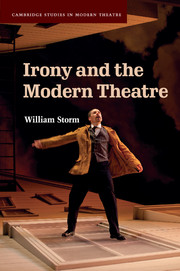Book contents
- Frontmatter
- Contents
- Acknowledgements
- Introduction
- 1 Irony personified: Ibsen and The Master Builder
- 2 The character of irony in Chekhov
- 3 Irony and dialectic: Shaw's Candida
- 4 Pirandello's “Father” – and Brecht's “Mother”
- 5 Absurdist irony: Ionesco's “anti-play”
- 6 “Ironist First Class”: Stoppard's Arcadia
- 7 American ironies: Wasserstein and Kushner
- 8 Irony's theatre
- Notes
- Works cited
- Index
2 - The character of irony in Chekhov
Published online by Cambridge University Press: 01 June 2011
- Frontmatter
- Contents
- Acknowledgements
- Introduction
- 1 Irony personified: Ibsen and The Master Builder
- 2 The character of irony in Chekhov
- 3 Irony and dialectic: Shaw's Candida
- 4 Pirandello's “Father” – and Brecht's “Mother”
- 5 Absurdist irony: Ionesco's “anti-play”
- 6 “Ironist First Class”: Stoppard's Arcadia
- 7 American ironies: Wasserstein and Kushner
- 8 Irony's theatre
- Notes
- Works cited
- Index
Summary
In The Master Builder, Henrik Ibsen uses the catalytic power of one character's opportune entrance to insure a forceful concentration of dramatic potential and ironic timeliness. The occasion of Hilda Wangel's appearance holds within it all the latent magnitudes of the drama that is to come, and Ibsen consciously employs the irony of this scenic moment to signal the many implications of youth's arrival in the master builder's domain. And, within the broader pattern of the play's dramaturgical arrangements, the playwright emphasizes timely entrances as an ongoing motif, not only in the case of Hilda but for Aline Solness as well. Ibsen is not alone with respect to such emphasis. Anton Chekhov is exacting, too, concerning the potentials that exist in the drama of entrances or arrivals – and, indeed, in the orchestration of his characters' comings and goings generally – but the effects that he derives from such arrangements are markedly different from what is encountered with Ibsen. Chekhov's own strategy of juxtaposition is such that irony is incorporated perpetually into the dramaturgical structure as well as, correspondingly, the tenor and tone of events and the interrelations among characters.
As The Cherry Orchard begins, for example, Yermolai Alekseyevich Lopakhin is one of the first two characters to appear on stage. The nursery at the estate house of Lyubov Andreyevna Ranevskaya is lit by a May dawn, and Lopakhin comes into the room with Dunyasha. Announcing that Madame's train has arrived, he inquires characteristically: “What time is it?” (315).
- Type
- Chapter
- Information
- Irony and the Modern Theatre , pp. 38 - 72Publisher: Cambridge University PressPrint publication year: 2011

